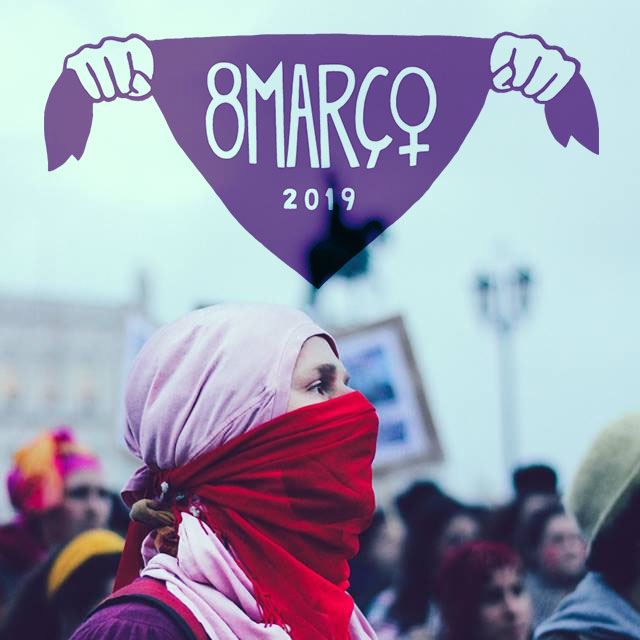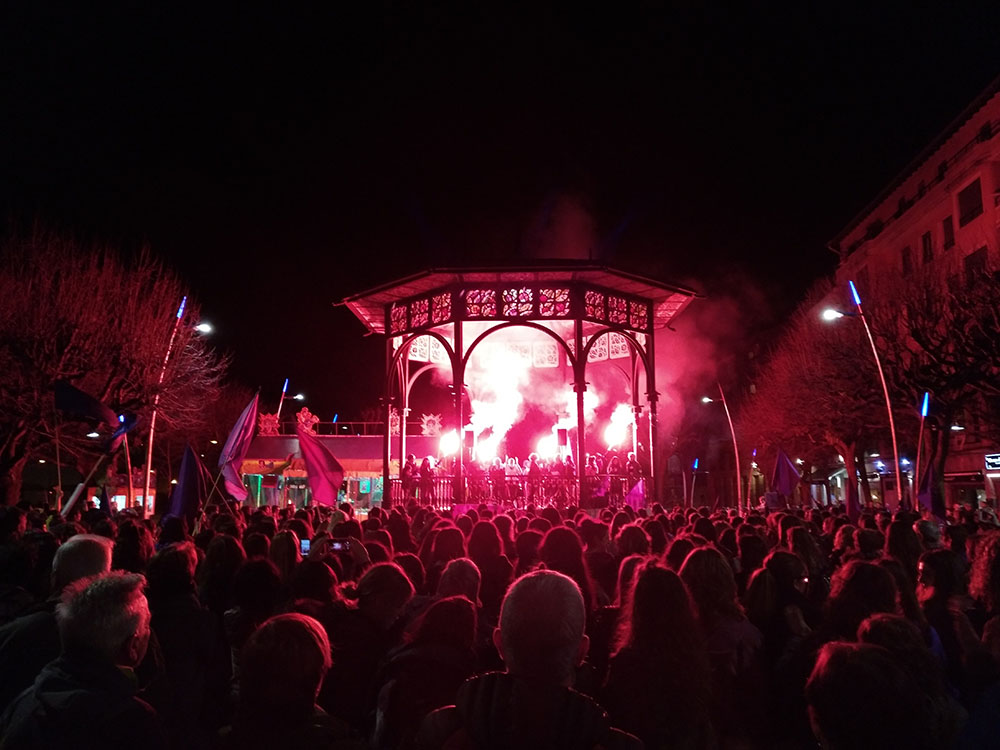Portugal // Feminist Strike – What is it and how it came about~ 8 min

Article by the Lisbon Feminist Assembly
What is a Feminist Strike
A Feminist Strike is a subversion by itself. By strike we mean “the collective and concerted suspension of work through worker initiative with the aim of obtaining a certain common interest or objective”. Calling a strike is a decision primarily reserved for the unions. This assumes that a strike is a mechanism of collective struggle reserved for people who participate in wage labor. That is, what the capitalist system considers productive work.
Said capitalist labor market does not recognize the productive and indispensable value of care work. It involves all material, relational and affective aspects related to the care of people. In fact, the market has ignored and made invisible the work and time expenditure of people who are responsible for human life and for vulnerable bodies (such as children, the elderly, dependent people, the sick…). In patriarchal societies, these are mostly women.
Neoclassical economics thus institutionalizes the separation between the public and the private, between mercantile production and domestic reproduction, centering our societies on capital to the detriment of life.
This sexual division of labor has historically allowed men to focus on wage labor without the constraints of responsibility for care work that we women have been forced to assume in the name of affection and the maternal condition. A recent study revealed that we are still five generations away from having Portuguese men share domestic chores equally.
This condemns five generations of Portuguese women to take on double and triple work shifts. This means adding to the hours dedicated to wage labor – without which they would be in a situation of total vulnerability and dependency – the hours required by care work. Sometimes, this implies not only child care, but also of the elderly and other dependents.
In the context of wage labour, we women continue to make an average of 16.7% less than men and we are underrepresented in sectors regarded as elite and decision-making positions. Meanwhile, we constitute the majority of the workforce in the most precarious and socially discredited jobs, which are seen as feminine. In Portugal, we represent 58.2% of the people who make minimum wage.Globally, there is a feminization of poverty. We are also the ones who suffer the most from bullying and sexual harassment in the workplace.
Additionally, we women must account for extra spending in terms of time and money to fulfill the role that patriarchal society imposes on us: to be the object of desire. That is, to comply with the beauty standards defined by the patriarchal capitalist system. This logic forces us to consume a set of products designed to break our self-confidence, our self-esteem and our dignity. To accept and reproduce the constant pornification and sexualization of our bodies, which become normalized as an object of consumption.
On the other hand, we still witness a reality in which, although there are a growing number of women in academia, we end up coming across a “crystal ceiling”. We do not reach the top places in academia, nor are our scientific contributions recognized. Instead, we become invisibilized in the historical narrative. We are also the first to abandon our studies when family conditions require taking care of someone.
Lastly, the Feminist Strike is an international movement to fight against sexist violence, which has been rising and becoming increasingly deadly as a response to the progressive emancipation of women all over the world. It encompasses mass femicides in Latin America, religious fundamentalism in various societies, sexual trafficking and the sex industry.
Patriarchal structures have attempted to limit and ban women’s freedom through humiliation, fear and even murder. In just two months, twelve women were murdered in Portugal. The Justice system, one of the largest patriarchal structures in existence, is constantly positioning itself against the victims. It apologizes and exonerates the aggressors and thus perpetuates a regime of impunity founded on misogyny.
For these and various other reasons, the Feminist Strike goes beyond the traditional concept of strike and operates on four interconnected pillars: wage work, care, study and consumption.
Taking each pillar as a starting point, we analyze the structural, systemic, and sex-based violence, inequalities and oppressions. We also propose concrete demands that will allow us to eradicate the structural inequality that persists to this day.
Considering how socially dependent we are on wage labor and the limitations of a strike as a concept, it becomes crucial to rely on union support to ensure the participation of women in the feminist strike. It is imperative that the feminist movement itself, from its base, decide the guidelines of this collective action.
As of this moment, five unions have already delivered strike notices for 2019: SNEsup (National Union of Higher Education); SIEAP (Union of Industries, Energy and Water of Portugal); STSSSS (Union of Health, Solidarity and Social Security Workers); STCC (Union of Call Center Workers) and STOP (Union of All Teachers). This is a great achievement for the Portuguese grassroots feminist movement, since there was no public support for the strike by institutionalized feminism in the previous two years. On the contrary, there was rejection and ridicule.
The history of the International Feminist Strike in Portugal
In 2017, a group of women outraged by the institutional and conformist character of feminism in Portugal (evident in the November 25 march, the International Day for the Elimination of Violence Against Women, headed by government members) founded the Feminist Assembly of Lisbon. It aimed at organizing a protest on March 8 and thus join the international feminist movement, subscribing to the Manifesto of Paro International de Mujeres / International Women’s Strike.

The main demands were an end to sexist violence, equal pay for men and women performing the same work, the end of double and triple work shifts in domestic chores, the creation of public daycare centers to support parenthood, an end of sexual and moral harassment and, last but not least, greater participation of women in public life. The gathering in support of the International Feminist Strike brought together around 400 people in Rossio, Lisbon.
In 2018, the Assembleia Feminista de Lisboa (Feminist Assembly of Lisbon) once again called for a day of struggle for women’s rights. It counted on the presence of other organizations and with the support of the Movimento Alternativa Socialista (MAS – Alternative Socialist Movement). The demonstration brought together about 2 000 people.

Just as in the previous year, this path was travelled by courageous and assertive women, organized outside of mainstream feminism and established political parties. Both in 2017 as in 2018, there was total silence on the part of the media about the protests of March 8.
Reflecting on the success of the International Feminist Strike in the Spanish state, and considering the high participation in Portugal in 2018 in relation to the previous year, in 2019 the Rede 8 de Março (March 8 Network) calls for a meeting. Said March 8 Network was constituted in 2011, as part of the demonstrations of November 25, and remained active until 2017. It is at that meeting that the current Rede 8 de Março was formed.
Nowadays, it is viewed as the national network of collectives, parties and associations, in which the Assembleia Feminista de Lisboa also participates, that jointly organizes the International Feminist Strike. At the time of its establishment, institutionalized feminist organizations and several parties once more moved away from this initiative. They considered it only symbolic, since it did not have union support.
After a long process of producing and disseminating materials, street actions, meetings and contacts with unions, schools and other associations and groups, we managed to obtain five strike notices – one of them from CGTP-IN (the largest union confederation in the country).
The whole process of building the strike in the different cities was always done with a logic of horizontality and open participation. Anyone could join one of the meetings at any time, contribute to the discussion and activities and be part of the communication channels. All are welcome to join and be part of the organizing group. This aspect is a positive factor in differentiating the feminist movement and, in particular, the building of the International Feminist Strike, from other movements and initiatives.
In 2019, the International Feminist Strike in Portugal, organized by the approximately 30 collectives that constitute the Rede 8 de Março, will take place in 13 cities through demonstrations and gatherings: Albufeira, Amarante, Aveiro, Braga, Coimbra, Covilhã, Évora, Fundão, Lisbon, Porto, São Miguel-Ponta Delgada, Vila Real and Viseu.




